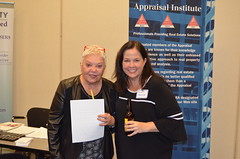Monthly Archives: November 2013
Illinois State Appraisal License Report
As of June 30, 2013, the number of active real estate appraisers in the U.S. stood at 82,250. According to a June 2013 sudy by the Appraisal Institute the number of appraisers decreased at an average rate of 3.0 percent per year over the past five years. As shown in the following data released from the Illinois Department of Financial and Professional Regulation (IDFPR) Illinois is no exception to the national trend:
As illustrated Illinois lost 519 (10.89%) licensed or certified appraisers over the last two-year renewal period. Data suggest that this rate of decrease could rise sharply over the next 5 to 10 years due to increased retirements, reduced numbers of new people entering the appraisal profession, economic factors, and greater use of data analysis technologies.
Uniform State Certification Examination
In 2008 the Appraiser Qualifications Board (AQB) began offerering its Uniform State Certification Examination. The authority for the AQB to set standards and approve examination content was established by Title XI of the Financial Institutions Reform, Recovery, and Enforcement Act of 1989. Below are the latest pass/fail statistics for Illinois of the Uniform State Certification Examination:
The Associate, Certified Residential and Certified General examinations are based upon 14 major content areas. Although the topics of the major content areas are the same for all three examinations, the emphasis devoted to the content areas differs in each examination. In Illinois Certified General Appraisers had the highest pass/fail ratio of 64% (on average), followed by the Certified Residential Appraisers (58%) and the Associate Real Estate Trainee Appraisers has the lowest pass/fail ratio at 52%:
The Associate Exam is composed of 100 questions plus five unscored pretest questions. The Certified Residential and the Certified General are composed of 150 questions. In addition to the number of questions that are used to determine your score, the examinations may contain up to 15 questions that are being pretested for future versions of the examination.
AARO Fall Conference-The First in a Three Part Series
On behalf of ICAP Karen Emerle, SRA attended the Association of Regulatory Officials (AARO) Fall Conference, where discussions included reciprocity, USPAP updates, mandatory background checks and more. This article, the first of a three-part series, summarizes the four days of regulatory discussion’s that will impact the future of real estate appraising for years to come.
The Association of Appraiser Regulatory Officials (AARO) has a new mission statement and updated Bylaws, which were adopted October 2013. According to their website www.aaro.net their mission is to improve the administration and enforcement of real estate appraisal laws in member jurisdictions.
This year’s fall conference held October 19-22, 2013 at the Westin Hotel, Washington D.C. was attended by representatives from the ASC, AF, ASB, AQB, APB, AMCs, Members of the Conference of State Bank Supervisors, AI, IAAO, Farm Credit Mid-America, and the NC Deputy Director and Legal Counsel. Topics of discussion at the conference included:
- Federal Updates;
- Background Checks-Alternatives to the FBI;
- AMC Registration and, Regulation Issues;
- USPAP Update for Regulators;
- Experience Training Concerns;
- Differing Terminology, Expectations and Requirements in Review Appraisal;
- a Town Hall covering a potpourri of topics and issues impacting the Appraiser Regulatory Agencies; and
- Experience Training Today and Beyond, and Enforcement-Hearing Preparation.
Additionally, time was allocated to various committee meetings and closed sessions related to specific job functions of investigators, attorneys, board members, administrators and AMCs.
Part One-Federal Updates:
One of the ASC’s core functions is to monitor the requirements established by the States for certification and licensing of appraisers qualified to perform appraisals in connection with federally related transactions. The Appraisal Subcommittee performs periodic Compliance Reviews of each State appraiser regulatory program to determine compliance, or lack thereof, with Title XI, and to assess the Program’s implementation of the AQB Criteria as adopted by the Appraiser Qualifications Board (AQB). Jim Park from the Appraisal Subcommittee provided historical context of legislation and announced that the AQB Policy Statements have been reduced from 10 to 7. The policy statements provided States with the necessary information to maintain their Programs in compliance with Title XI. The revised statements are as follows:
- 1 –Statutes, Regulations, Policies and Procedures Governing State Programs;
- 2 –Temporary Practice;
- 3 –National Registry;
- 4 –Application Process;
- 5 –Reciprocity;
- 6 –Education;
- 7 –State Agency Enforcement; and
- 8 –Interim Sanctions.
Policy Statements 1 through 7 correspond with the categories that are evaluated during the Compliance Review process and included in the ASC Compliance Review Report and Policy Statement 8 sets forth required procedures in the event that interim sanctions are imposed against a State by the ASC. Mr. Park also discussed the revised Compliance Review Findings categories for state programs as follows:
- Excellent;
- Good;
- Needs improvement;
- Not satisfactory; and
- Poor.
To view the Appraisal Subcommittees Policy Statements (revised June, 2013) Click Here.
Mr. Park discussed appraisal reciprocity, reiterating the ASC suggestions that States consider implementing, at a minimum, the following features in their reciprocity policies:
- A simple application;
- No reexamination;
- No additional review of an applicant’s education or experience;
- Reciprocal licensing or certification fees similar in amount to the corresponding fees for “home” State appraisers; and
- The collection and forwarding to the ASC of the National Registry fee for each reciprocally licensed or certified appraiser.
Reciprocity’s main benefit is that appraisers who qualify for certification or licensing in one State may freely cross into another State without needing to “register” for each appraisal assignment in the other State. Therefore, a duly certified or licensed appraiser in one State can be recognized as such in each of the other States in which he or she is licensed or certified by reciprocity. The ASC endorses reciprocity and urges the States to establish permanent reciprocity arrangements promptly to address the needs of certified or licensed appraisers who practice on a non-temporary, multi-state basis.
Mr. Park also discussed the Appraisal Complaint National Hotline (Hotline), which is to refer complaints to the appropriate State and/or Federal agencies in order to handle complaints of alleged violations of the Uniform Standards of Professional Appraisal Practice (USPAP) and/or appraisal independence requirements.
As part of its State agency monitoring process, the ASC will evaluate the effectiveness with which each State agency follows up complaints from financial institutions and other persons who report instances of appraiser incompetence or unethical behavior. Mr. Park indicated that Dodd Frank gave the Appraisal Subcommittee the authority to follow up on complaints; however, did not give it the authority to handle complaints. It was noted that as of the date of the conference the ASC has chosen no to follow up on complaints. Click the following to go to the Appraisal Complaint National Hotline.
In addition to the discussions regarding the Hotline Mr. Park indicated that the ASC is working on the following special projects:
- Develop a plan for the establishment of an ASC Advisory Committee (by the end of 2014) which pursuant to the Dodd-Frank Act will give the ASC new rulemaking and additional sanctioning authority;
- Create a unique National Registry number for each appraiser, which will be available to the appropriate State and Federal regulatory agencies to simplify multi-State queries regarding specific appraisers. This unique appraiser identifier will provide the background and schooling of every appraiser;
- The development of Webinars on the recent changes for State Programs.
To view the Appraisal Subcommittees 5-year Strategic Plan (2014-2018) Click Here.
John Brenan of The Appraisal Foundation spoke about the changes in the 2014-15 USPAP, to view The Foundations video presentation of the changes in the 2014-15 USPAP click the following link: Video: 2014-15 USPAP Summary of Actions, while this video is not intended to replace a course it does provide summary information about the recent changes and provides assistance in advance of USPAP update course.
Mr. Brenan addressed the unintended consequences that Dodd Frank had on Appraiser/Client Communication and the erroneous belief that one can’t talk to an appraiser or ask questions. To address some of the misunderstandings regarding Dodd Frank The Appraisal Foundation is developing a brochure and new videos; of which, one will be directed to consumers that they anticipate will debut in November 2013 with the purpose to help home buyers understand lenders underwriting decisions.
Mr. Brenan also discussed a course currently being developed by Larry Disney that will address the examination of appraisals in order to make sure the examination process is handled appropriately. In addition, Mr. Brenan indicated that the Appraisal Subcommittee is working on a State Investigator Training Course that will be offered for free to state investigators. The Appraisal Subcommittee is also looking at the possibility of reviving the interest in publishing a compilation of court cases from various States.
The Appraisal Subcommittee has several other items that they are considering looking into including the possibility of building an appraiser database to substantiate the value of green building adjustments and addressing Geographical Competency.
Barry Shea from the Appraisal Standards Board discussed USPAP education courses and the 2016 USPAP publication. Mr. Shea mentioned that changes must be adopted by early 2015 for the 2016 Publication. The issues currently being discussed for the 2016-2017 release of USPAP are:
- Clarifying or rewriting definitions; including, draft reports and revised appraisal reports;
- Incorporating Advisory Opinions into the rules and standards; and
- Determining if the level of understanding of USPAP is where it should be.
Wayne Miller from the Appraisal Qualification Board discussed topics related to Real Property Qualifications Criteria, national exams, age and education level of new exam applicants. Mr. Miller indicated that in 2015 the education requirement will be a Bachelors Degree or higher and that USPAP instructors must complete the Instructor Recertification Course (IRC) before March 3, 2014 if they wish to continue to teach. Mr. Miller discussed the AQB’s Course Approval Program (CAP) which was established at the request of and as a service to state appraiser regulatory agencies and providers of real estate appraisal education. The AQB hopes this voluntary program will provide a minimum level of acceptance for real estate appraisal education courses meeting the Real Property Appraiser Qualification Criteria established by the AQB. The CAP has 300 courses including 8 university degree programs that are approved by the AQB. To read more about the AQB’s CAP program Click Here.
John Brenan from the Appraisal Practices Board (APB) discussed that the APB is looking for Subject Matter Experts (SMEs), who are recognized individuals with expertise in the specific topic being considered, to research and detail all pertinent sources of existing information on the given topic. The APB offers voluntary guidance in topic areas which appraisers and users of appraisal services feel are the most pressing. Currently the APB is working on valuation of green buildings which will have three core segments including:
- Background;
- Competency; and
- Methodology
Other APB projects include appraising newly constructed residential properties, collection and verification of data and a concept paper regarding the valuation issues with appraising tangible and intangible property (specifically with regard to hotel valuation). The APB valuation advisory website currently has 5 valuation advisory topics on their website. To access a APB Valuation advisory topic click below:
APB Valuation Advisory #1: Identification of Contributory Assets and Calculation of Economic Rents
— Identification of Contributory Assets and Calculation of Economic Rents (Tool Kit)
APB Valuation Advisory #2: Adjusting Comparable Sales for Seller Concessions
APB Valuation Advisory #3: Residential Appraising in a Declining Market
APB Valuation Advisory #4: Identifying Comparable Properties – Revised
Mr. Brenan indicated that only 30% of appraisers belong to a professional organization and that that the Appraisal Practices Board was developed to inform the appraisers who don’t belong to a professional organization.
During the conference attendees were reminded that the AQB strongly encourages all interested parties including appraisers to comment on exposure documents. All potential revisions to USPAP, qualification criteria, and voluntary guidance on recognized methods and techniques, as well as many other ASB, AQB and APB communications are released for comment prior to adoption. The AQB encourages public input and considers all comment letters prior to taking any final action. To review the Appraisal Foundations exposure Drafts and to comment click here.
~ Karen T. Emerle, SRA















